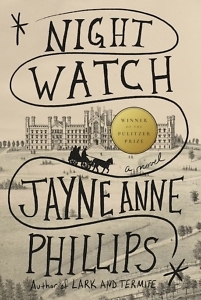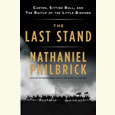Small Victories
In Jayne Anne Phillips’ prize-winning novel, West Virginia women find refuge after the Civil War
The opening sequence of Jayne Anne Phillips’ Night Watch, the 2024 winner of the Pulitzer Prize for Fiction, raises more questions than it answers. In 1874, a character known only as Papa takes a woman, apparently his wife, to a mental asylum in West Virginia. He tells her that she is now called “Miss Janet” and her 13-year-old companion (daughter?) should transform her name ConaLee into “Connolly.” Before they reach the institution’s gates, he orders them to get out and walk the rest of the way. “I am not yer Papa,” he tells ConaLee, “and you don’t know my name.” His identity is a mystery, but already we know we don’t like him.

The hospital where Miss Janet and ConaLee are admitted, a “castle” emerging from the dark woods, is the Trans-Allegheny Lunatic Asylum. Two hundred feet high and a quarter-mile across, it seems too good to be true, but the asylum was a real place, providing Phillips the ideal setting for her tale of finding humanity in the aftermath of war. Built in the 1850s under the auspices of Thomas Story Kirkbride, the historical institution treated patients from all walks of life with a broad range of psychiatric maladies. Kirkbride’s guiding philosophy, “moral treatment,” finds its fictional avatar in Dr. Thomas Story, the asylum’s medical superintendent (and Kirkbride’s cousin), who takes special interest in the case of the troubled, and largely mute, Miss Janet.
Told in four parts, Night Watch moves back and forth from 1874 to 1864, when the story begins chronologically on a remote “ridge” in West Virginia, where three generations of women have been left to fend for themselves. Though far from the battlefront, they find themselves at the mercy of stray soldiers, from both sides of the war, who wander near their compound. “We were hiding from the War and the men leaving the War,” ConaLee says. A “granny neighbor” named Dearbhla (Durv-la), whom locals fear for her Irish hexes, provides another layer of protection, though they discover to their horror that it’s insufficient.
Phillips’ novel offers a fresh vantage on America’s bloodiest war. From the West Virginia hills, the conflict feels abstract, almost foreign, yet its young men feel compelled to join the fight — for the Union or the Confederacy, depending on familial allegiances — leaving the region as a vulnerable matriarchy. The novel pays special attention to Irish immigrants, many of them indentured servants who fought for the Union to secure their freedom. Despised as a class and abused by their masters, Irish men dream that a Union victory will enable them to become fully American.
 The asylum scenes in 1874 offer a respite from the gruesome violence of war. Phillips describes one battle in particular with up-close detail that captures its confusion and terror. “Gunpowder had so thickened the air that brush and trees ignited,” Phillips writes. A character known as “the sharpshooter” finds himself in the middle of the melee, shooting blindly at invisible enemies until one fells him with a stone. When violence is visited upon the women, Phillips depicts the assault with pointillist plausibility, each moment of the torture drawn out to disturbing effect.
The asylum scenes in 1874 offer a respite from the gruesome violence of war. Phillips describes one battle in particular with up-close detail that captures its confusion and terror. “Gunpowder had so thickened the air that brush and trees ignited,” Phillips writes. A character known as “the sharpshooter” finds himself in the middle of the melee, shooting blindly at invisible enemies until one fells him with a stone. When violence is visited upon the women, Phillips depicts the assault with pointillist plausibility, each moment of the torture drawn out to disturbing effect.
Night Watch is animated throughout by Phillips’ careful attention to period detail. She re-creates the clamor of a war hospital in Alexandria and the dusty shelves of a small-town dry goods store. The author takes special care to capture the social mores of her two worlds: the desperate survivalism of the war years, contrasted with the humane discourse at the asylum. The dialogue sounds authentic without descending into burlesque. ConaLee, who narrates much of the novel, has clearly benefitted from her homeschooling in the works of Dickens, Shakespeare, and the Romantics. The pages are littered with 19th-century argot: prospective readers should look up buckboard and bushwhacker before beginning the novel.
Despite the bloodshed, this novel insists on the reemergence of our nature’s better angels. A soldier who loses one eye and most of his memory in battle finds a new home with his attending physician. The asylum’s head chef, whose institutional power appears absolute, provides a home for local orphans. “Our lives are small, our victories smaller,” as one doctor puts it. These characters learn to extend kindness where they can and celebrate minor joys when occasions warrant it. And, if a chance for sustained happiness presents itself, strap it to your buckboard and head for the hills.
Those rare moments of light remain shadowed by the cataclysm of war. When the titular Night Watch tells Dr. Story that he has no family, the doctor responds sympathetically. “It’s common in these times,” Story says. “So many of our patients, all classes of society, find themselves sole survivors, nine years on, of our — national catastrophe.” To which the Night Watch remarks, somberly, “It is still — unspooling … like a malignant thread.”

Sean Kinch grew up in Austin and attended Stanford. He earned a Ph.D. from the University of Texas. He teaches English at Montgomery Bell Academy in Nashville.


